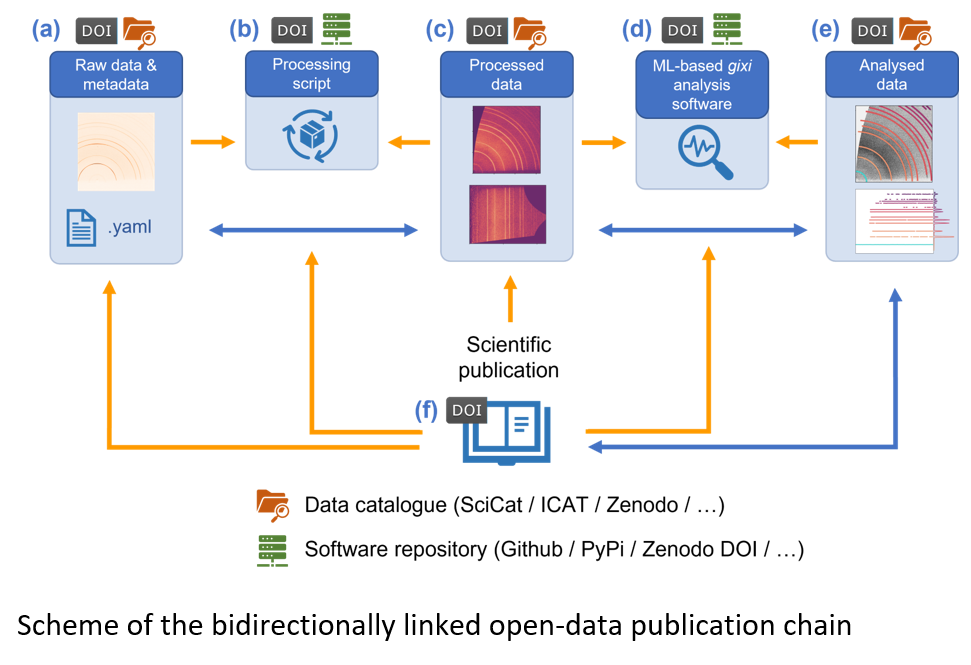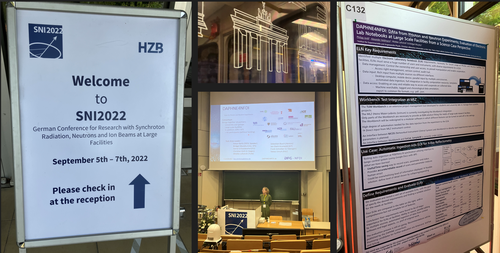News
- 21st to 22nd, January 2026
-
Annual in-person meeting of Task Area 2 at the Friedrich-Alexander-University Erlangen-Nürnberg (FAU), Germany
The first day of the Task Area 2 annual meeting began with a focus on user requirements, an important step toward aligning ongoing software development with the needs of the diverse communities ... read more
-
-
12th to 14th January 2026
-
Annual meeting of the Task Area 1 at the research center in Garching
-
The event opened with a comprehensive status update from the participating institutes, providing a shared foundation for the discussions that followed. The program continued with presentations on Electronic Laboratory Notebooks (ELNs), the NeXus file format... read more.
-
-
8th to 9th of December 2025
-
Annual face to face meeting of Task Area 3 in Tübingen
-
On December 08 and 09, 25 DAPHNE4NFDI colleagues met for the annual TA3 meeting at the Eberhard Karls University of Tübingen.The program consisted of dedicated talks on scientific software packages ... read more.
-
6th to 10th July 2025
-
-
The 15th International Conference on Neutron Scattering (ICNS) Successfully Concludes in Copenhagen and Lund
- DAPHNE4NFDI took part in the 15th International Conference on Neutron Scattering (ICNS) in Copenhagen, Denmark and Lund, Sweden which was held from 6th to 10th July 2025 and attracted over 780 participants. A key highlight was the talk of Wiebke Lohstroh ... read more.
- 1st of June, 2025
-
New project coordinator at DAPHNE4NFDI: Welcome, Zeynep!
- We are delighted to welcome Zeynep Işıl Işık Dursun (PhD) as the new project coordinator of DAPHNE4NFDI.
- With her extensive experience in project coordination, scientific research and communication, Zeynep brings a wealth of expertise - read more.
- 27th of May, 2025
-
Invitation to the Bad Honnef Seminar 2025: FAIR Data for Photon and Neutron Research
- DAPHNE4NFDI invites you to the Bad Honnef Seminar 2025: "Opportunities and Challenges of FAIR Data at Photon and Neutron Facilities"
- When: 12-15 October 2025
- Where: Physics Centre Bad Honnef, Germany
- This is an excellent opportunity for early-career researchers to dive deep into the future of research data management. We are excited to welcome an outstanding line-up of experts, including - read more.
- 27th of May, 2025
-
FAIR Data: Bridget Murphy's lecture on scientific excellence
- A valuable presentation for the DAPHNE4NFDI community by Dr. Bridget Murphy, highlighting the importance of FAIR Data Principles and data management. - read more.
- 27th of May, 2025
-
DAPHNE4NFDI at the ISC High Performance 2025 in Hamburg
- DAPHNE4NFDI participated in the ISC High Performance 2025 in Hamburg, the leading event for High Performance Computing, AI, Data Analytics and Quantum Computing.
- At a joint booth, DAPHNE4NFDI was presented together with partners of the ErUM framework programme (funded by the BMBF), including the LHC ErUM FSP - the combined research focus of the ALICE, ATLAS, CMS and LHCb experiments - as well as the FIDIUM project from the ErUM Data Hub.- read more.
- 27th of May, 2025
-
Two DAPHNE4NFDI contributions published at SRI 2024
- We are pleased to announce that two of our contributions have been accepted in the Proceedings of the 15th International Conference on Synchrotron Radiation Instrumentation (SRI 2024). - read more.
- 27th of May, 2025
-
NeXus Ontology and its Use for FAIR Experimental Data
- The aim of this talk is to provide the participants with a clear understanding of how the community-driven NeXus data model and its formal ontological representation can be extended by specific experimental communities and seamlessly integrated into the NOMAD platform to achieve end-to-end FAIR compliance for experimental data.- read more.
- 5th of May, 2025
-
NFDITalk: How we make data FAIR at DAPHNE4NFDI
- A successful presentation by our speaker Dr. Bridget Murphy, in which she sheds light on the crucial role of #FAIR data management and AI-based analysis in photon science on 5th of May 2025 at 4:00 PM on the Youtube channel of the Nationalen Forschungsdateninfrastruktur (NFDI).
- As part of the NFDI network, DAPHNE4NFDI is committed to expanding research data infrastructures and promoting - read more.
- 9th of April, 2025
-
NEPHEWS virtual training
- The recordings of the recent NEPHEWS Virtual Training are now online…
- This series is a great resource for anyone interested in photon and neutron sciences, accelerator physics and data-driven research.
- Bridget Murphy, spokesperson for DAPHNE4NFDI, and Astrid Schneidewind, a core member of our consortium, gave valuable talks - read more.
-
24. - 26. March, 2025
-
DAPHNE4NFDI Annual Meeting 2025 – Growing Stronger Together
-
From March 24-26, 2025, 110 participants gathered at Helmholtz-Zentrum Berlin (HZB), Campus Adlershof for another exciting Annual Meeting. This year’s event highlighted advances in FAIR data management and AI-driven analysis for photon science, progress in the use cases for DAPHNE4NFDI, updates from facilities, existing and potential collaborations within National Research Data Infrastructure (NFDI), and – read more.
-
-
07. January, 2025
-
Find the Perfect ELN for Your Research: A Practical Guide for Scientists
-
We are pleased to announce that our newly published study, “Specifications for Electronic Laboratory Notebooks (ELN) in the Photon and Neutron Community”, has been published in the prestigious SRN Journal. The study highlights the crucial role of Electronic Laboratory Notebooks (ELNs) for large research infrastructures. A central element of our study is a proven framework that helps researchers evaluate existing ELN solutions – read more.
-
-
24th and 25th of February
-
DAPHNE4NFDI workshop organized by TA3
The European XFEL hosted a 2-day workshop (24th and 25th of February) on good practice of software development and IT operations (DevOps), attended by almost 30 active participants. The focus of the program with 8 talks and two hands-on sessions was on the creation and deployment of containers. Further aspects presented and discussed included the connection of containers with continuous integration workflows, as well as a glimpse into orchestration with Kubernetes. This event aimed at the harmonization of knowledge concerning software development and deployment, suited to foster good collaboration on the DAPHNE4NFDI software projects, in pursuit of high quality and maintainability of data management and data analysis services for the photon and neutron communities.
-
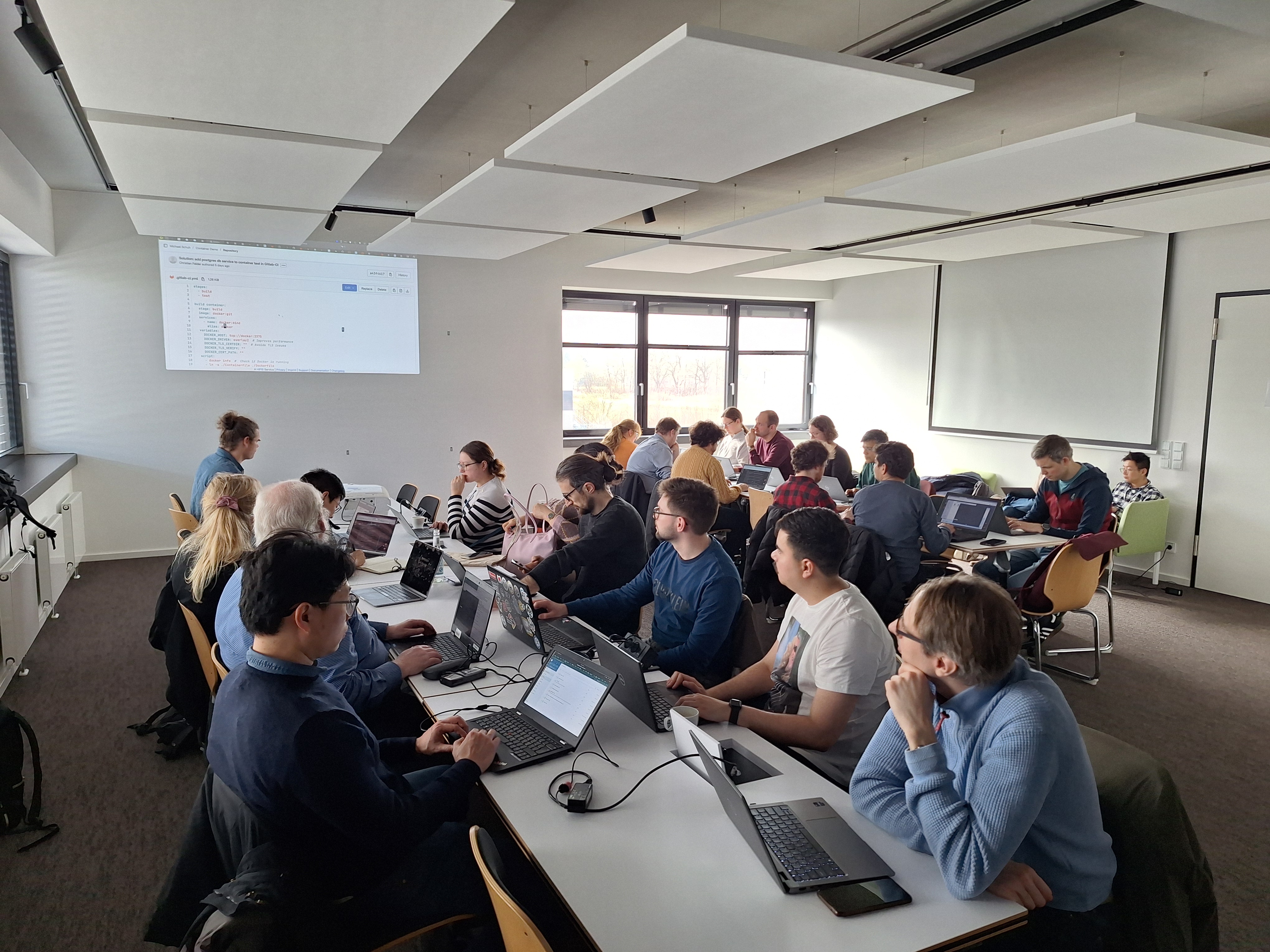
-
-
16.-21. March, 2025
-
Be there! DPG Spring Conference Condensed Matter Section (SKM) 16.-21.03.2025 in Regensburg
-
Before the calendar fills up, we would like to invite you to register for our upcoming DAPHNE4NFDI Talks at the DPG-Frühjahrstagung 2025 in Regensburg.
Please note that there will be a special session on "Extending the boundaries of fair data practices for insights in condensed matter: from workflows to machine learning (SYFD)" (F. Schreiber, B. Murphy, C. Draxel).
Registration and further information: More information & Registration
-
-
24.-26. March, 2025
-
Be there! DAPHNE4NFDI annual conference 24.-26.03.2025 in Berlin
-
Before the calendar fills up, we would like to invite you to register for our upcoming DAPHNE4NFDI Annual Conference 2025 in Berlin.
Venue: The conference will take place on the main campus of the Helmholtz-Zentrum Berlin Adlershof (HZB) from March 24-26, 2025.
Agenda: The three-day meeting aims to cover a spectrum of topics, including updates and highlights from various DAPHNE4NFDI task areas and use cases involving metadata, ELNs, data analytics software, machine learning and much more. We will have short presentations, plenty of room for discussion and networking events.
Registration and further information: Link under construction
-
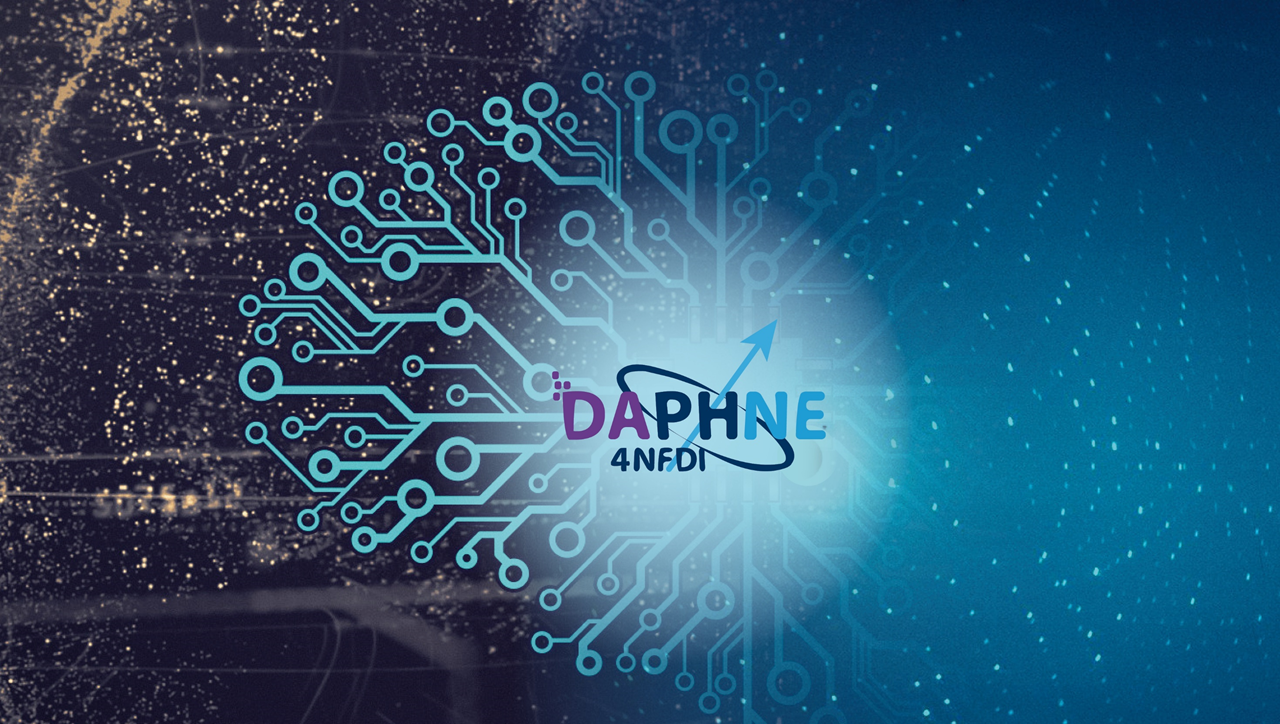
-
-
12.-15. October, 2025
-
Join us! Bad Honnef Seminar 2025
-
Before your calendar fills up, we’d like to invite you to register for our upcoming Bad Honnef Seminar 2025.
-
Dear colleagues and friends,
We are delighted to invite you to the DAPHNE4NFDI Bad Honnef Seminar 2025! Under the theme "From Data to Science at Synchrotron and Neutron Facilities – Potential and Limitations", the event will take place at the Physikzentrum of the German Physical Society in Bad Honnef. This beautiful venue, located near the Rhine River, provides the perfect setting to exchange knowledge and build valuable connections.
Be curious, join us, and benefit from the network!
This autumn school offers you the opportunity to dive into the world of data from synchrotron and neutron facilities. Discover the current state of research and explore innovative approaches in data management, FAIR principles, optimized workflows, and cutting-edge data analysis methodologies.The seminar is aimed at early-career researchers as well as experienced professionals from IT, physics, and other scientific disciplines (e.g., chemistry, biology). Its goal is to create a platform for interdisciplinary exchange and to learn from the expertise of renowned specialists.
Venue: Physikzentrum Bad Honnef, Germany
Registration and more information: Link under construction
-
-
11. November, 2024
-
First DAPHNE4NFDI Vision Workshop in Göttingen: Pioneering the Future of Research Data Management with ELNs and SciCat!
-
Our vibrant DAPHNE4NFDI Vision network of young scientists just wrapped up an unforgettable first workshop in Göttingen, the historic city of scientific discovery and home to luminaries like Carl Friedrich Gauss! Known for its legacy in physics and mathematics, Göttingen set the perfect stage for advancing research data management with Electronic Lab Notebooks (ELNs) and the powerful SciCat metadata catalog.
-
Workshop Highlights:
-
ELNs at the Forefront: We explored two revolutionary ELNs:
-
SNIP — Developed at the University of Göttingen with support from DFG (SFB 1456) and DAPHNE4NFDI.
-
LabIMotion — From KIT, transforming the way research data is documented, managed, and accessed!
-
-
SciCat Integration — Our discussions highlighted SciCat’s role in creating a unified data ecosystem, where ELNs integrate to enable accessible, interoperable, and FAIR-compliant data sharing across institutions. A giant leap for research collaboration!
-
-
Building Connections:
-
Beyond technical discussions, this workshop served as a vibrant networking platform, connecting young scientists across Germany to share visions, lay the groundwork for future collaboration, and establish the FAIRmentality .
-
With new insights and strong connections, we’re all eagerly looking forward to next year’s DAPHNE4NFDI Vision gathering! Here’s to driving innovation and shaping the future of data research management in neutron and photon research!
-
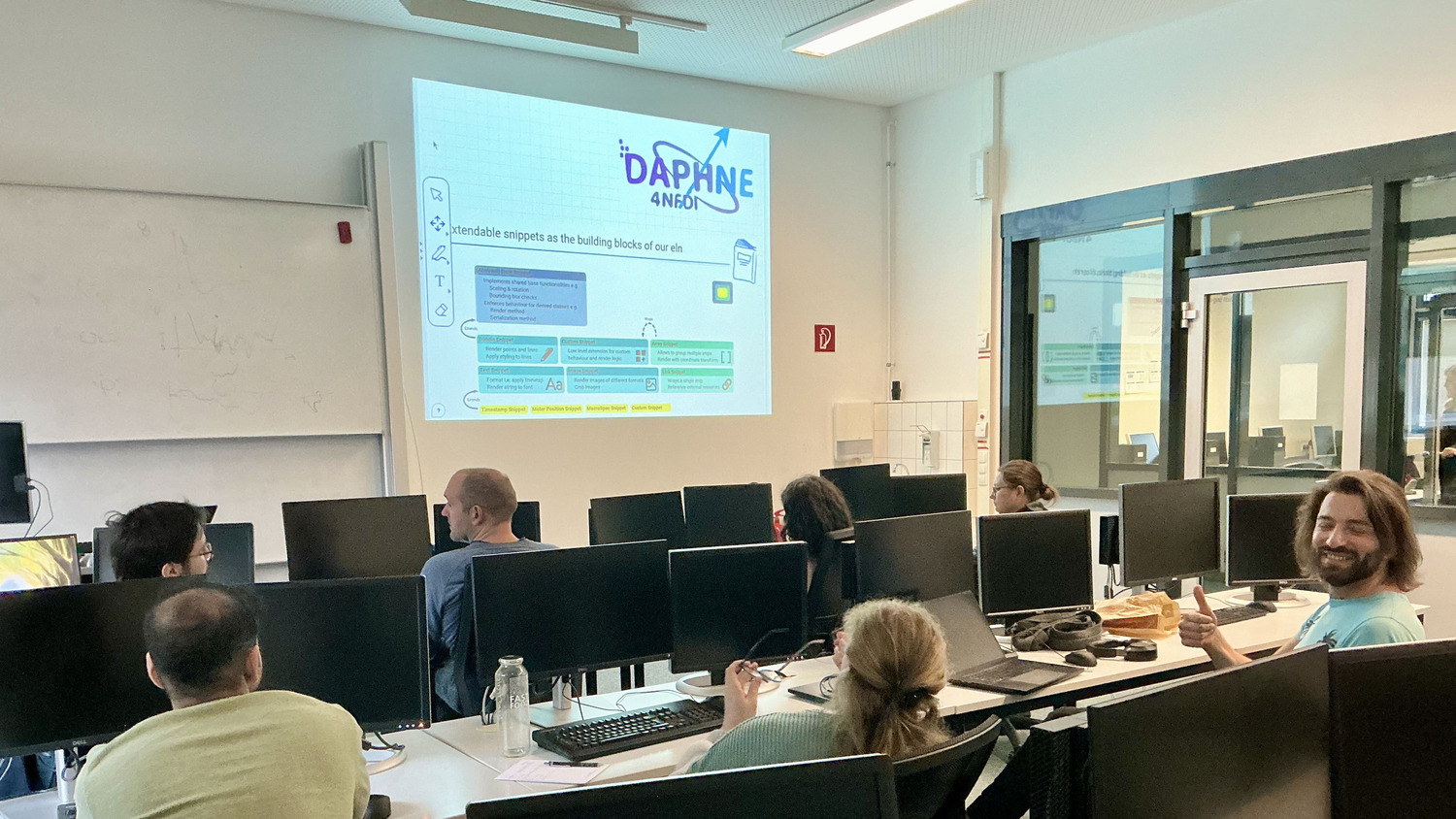
-
-
26.-30. August, 2024
-
DAPHNE @ "15th International Conference on Synchrotron Radiation Instrumentation"
-
The opening of the 15th International Conference on Synchrotron Radiation Instrumentation (SRI), held from August 26 to 30, 2024, at the CCH Congress Center in Hamburg, is a significant event. Over 1,000 experts from around the world gather at this prestigious event, recognized as the world's leading forum for the advancement of major X-ray radiation sources.
The opening on August 27 was officially conducted by the Second Mayor and Hamburg Senator for Science, Research and Equality, Katharina Fegebank, as well as the Schleswig-Holstein Minister for Education, Science, Research, and Culture, Karin Prien.
This afternoon, we are looking forward to an exciting talk by Anna Zimina titled: "Demand on Advanced Operando Characterization on Industrial Relevant Catalysts Using Combination of X-rays Based". On Friday, another highlight will follow as Lisa Amelung presents the talk "DAPHNE4NFDI - improving research data management at Synchrotron Facilities".
We would also like to highlight the visit of NFDI Director York Sure-Vetter to the booth of our consortium DAPHNE4NFDI. We are proud to be part of this important initiative to improve the transparency, FAIRness, and reusability of data at photon and neutron sources.
-
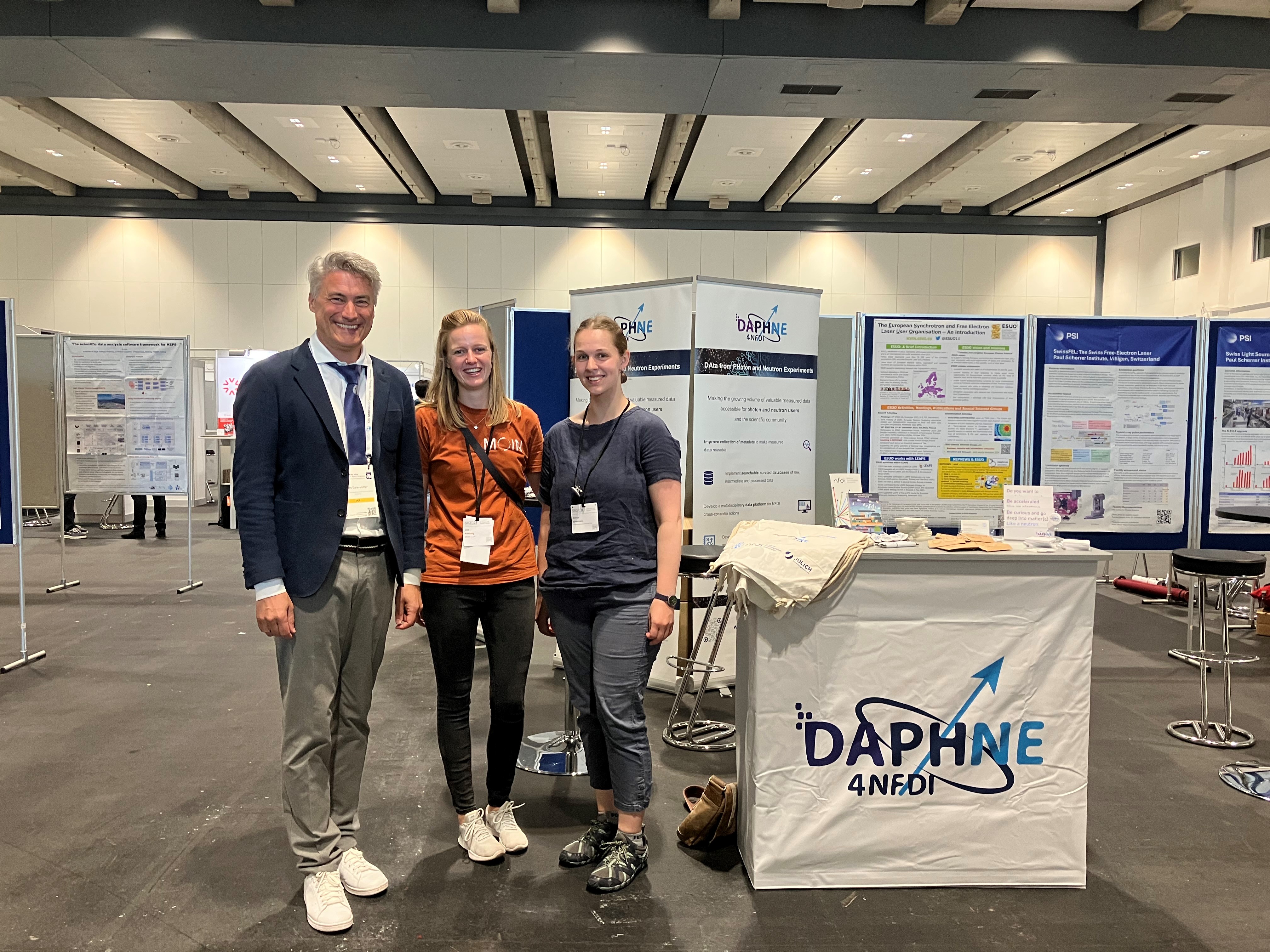
York Sure-Vetter, Lisa Amelung and Svenja Hövelmann (from left to right) Source: LinkedIn More information:
-
SRI2024
Program SRI 2024 (26-30. August 2024): Tagesordnung · DESY-Konferenzverwaltung (Indico) -
-
11.-13. March, 2024
-
Join us! DAPHNE4NFDI Annual Meeting 11.-13.03.2024 in Dresden
-
Before your calendar gets too busy, we would like you to register for our upcoming DAPHNE4NFDI Annual Meeting 2024 in Dresden.
-
Event venue The meeting will take place in-person on the main campus of Helmholtz-Zentrum Dresden-Rossendorf HZDR from March 11th to March 13th, 2024.
-
Agenda: The three-day event aims to cover a spectrum of topics including updates and highlights from DAPHNE4NFDI`s different task areas and use cases concerning metadata, ELNs, data analysis software, machine learning, and much more. We will have flash talks, cross-cutting parallel sessions and networking events.
-
Registration and more information: https://events.hifis.net/e/DAPHNE4NFDI_2024
-

-
15. November, 2023
-
Astrid Schneidewind new chair of the European Neutron Scattering Association (ENSA)
-
The European Neutron Scattering Association met on 15th November and elected Astrid Schneidewind (Forschungszentrum Jülich) as the new chair. Congratulations to our co-spokeperson Astrid for her new role!
-
-
13-14. November, 2023
-
DAPHNE4NFDI-ENSA-ESUO European Data Policy Meeting
-
The DAPHNE4NFDI-ENSA-ESUO European Data Policy Meeting took place at PSI on 13-14 November, 2023.
The European users’ organizations ENSA and ESUO in collaboration with the DAPHNE4NFDI consortium met to discuss implications of FAIR data and Open Data policy for the European PaN community. The purpose of this meeting was to involve the users via their national representatives in ENSA and ESUO to get as wide as possible an input and discuss the issues from differing national user communities’ perspectives, with the final objective of developing a “white paper” addressing the topics and challenges in the process of FAIR implementation in the PaN facilities. More than 50 participants including ESUO and ENSA delegates from different countries and DAPHNE4NFDI members attended the meeting.
The first day started with talks related with “Open Data Policies”, followed by an overview on the OSCARS, ExPaNDS | PaNOSC and DAPHNE4NFDI projects. Afterwards an exchange was held on the outcome of the Open data survey initiated by ESUO and ENSA. The Open Science White Paper topic strongly motivated the participants, who were divided into parallel working groups for discussion. The five working groups focused on:
- FAIR data principles and benefits to the community
- Scientific good practices in the PaN community with data handling
- Role and responsibilities of research facilities and users
- Shared accountability / workflows and best practice procedures (communication, alignment, etc.)
- Current status of FAIR Open Data implementation at the PAN facilities
-
The second day new working groups were organized and the discussions on the mentioned topics continued with a final report on the outcomes of the different working groups and how these could be implemented to the Open Science White Paper. The meeting finished with an overview on how to proceed on the Open Science White Paper.
-
-
03. November, 2023
-
Christian Gutt and Birgitt Kanngießer new chair and vice chair of the KFS
-
On 3rd November 2023, the constituent meeting of the Committee Research with Synchrotron Radiation elected Christian Gutt (University of Siegen) and Birgitt Kanngießer (Technische Universität Berlin) as the new chair and vice chair of the Committee. Congratulations to our co-spokepeople for their new role!
-
-
24.-25 October 2023
-
SciCat Coding Marathon with Max Novelli at the ESS
-
Important topics for DESY/DAPHNE4NFDI were discussed, hands-on work on Release 4.4 was carried out and the collaboration was strengthened through personal contact. Present were (from left to right): Marco Leorato (MaxIV), Daphne van Dijken (MaxIV), Max Novelli (ESS), Nicolas Hayen (CAU Kiel) and Regina Hinzmann (DESY), joined online by Spencer Bliven (PSI) and Despina Adamopoulou (EMPA). It was a very productive two days!
-
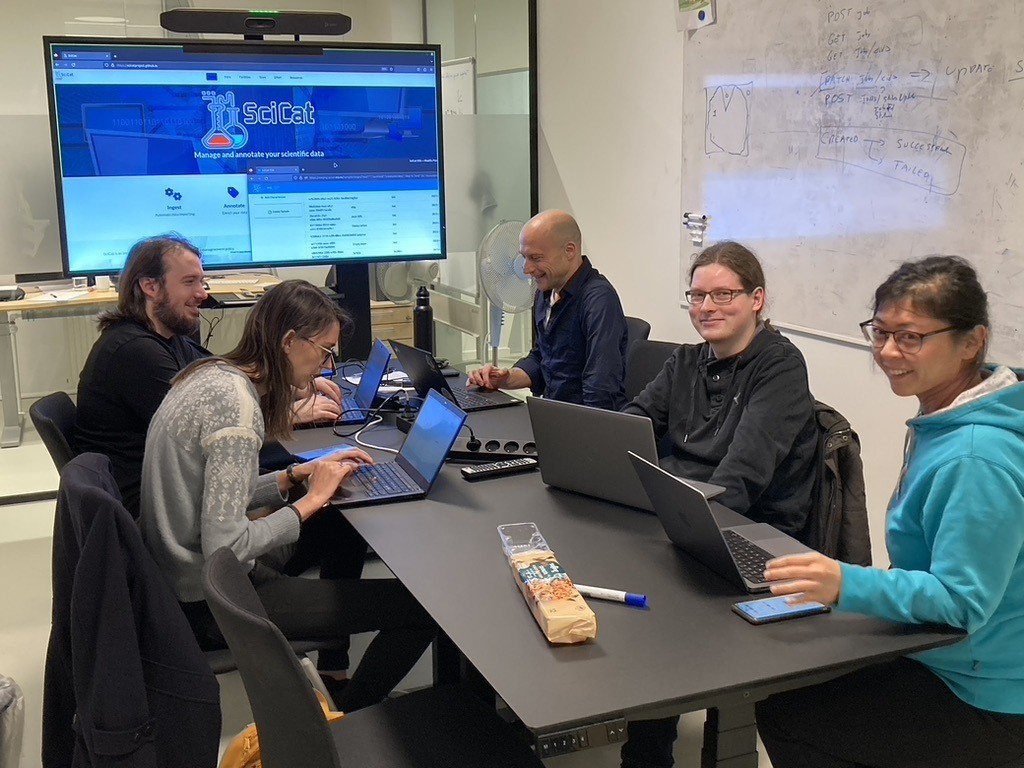
-
-
12-14. September, 2023
-
DAPHNE4NFDI @ "1st Conference on Research Data Infrastructure"
-
The Association “German National Research Data Infrastructure” promoted, from September 12th to 14th 2023, the “First Conference on Research Data Infrastructure”. The conference, hosted in Karlsruhe, gathered 760 participants from a wide variety of different communities, with several international stakeholders presents. Over the course of the three days, the most recent developments in research data management and related tools were presented and discussed in a passionate and lively way. The participants were also inspired by two exciting keynote lectures, by Distinguished Professor Christine L. Borgman (University of California, Los Angeles) and Dr. Mark D Wilkinson (Universidad Politécnica de Madrid).
-
Prof. Borgman critically discussed the concept of research data and the value associated to this, highlighting not only the strengths of the global efforts in improving RD infrastructure, but also their shortcomings and the necessary steps, also cultural, for an improved transition towards effective RDM. Dr. Mark Wilkinson, the lead author in the seminal paper discussing the FAIR Data Principles, reconstructed the story of how some of these principles came to be and how the successive developments led him to rethink about some. He also outlined the challenges but especially benefits of FAIR in-practice.
-
A different but nonetheless inspiring approach was explored during the public lecture given by artist Julia Janssen. Through a voyage through her everyday life, she evidenced the influence of digitalization and information technology on our society, with a particular eye with respect to data sovereignty and the struggles for a proper management of transparency and control over personal data.
-
DAPHNE4NFDI was present with 15 delegates, which contributed not only with four posters, but especially with an equal number of oral presentations. DAPHNE4NFDI speaker (statutes) Bridget Murphy presented the consortium to the audience, describing its aim, methods and also evidencing the strong synergy with the PUNCH4NFDI consortium, in a talk entitled “The DAPHNE4NFDI and PUNCH4NFDI Consortia in the NFDI”. More details about the technical solutions and RDM approaches exploited in DAPHNE4NFDI were for example given by Oliver Knodel and Paolo Dolcet. Through the example of HZDR, Oliver Knodel discussed how the Heliport RDM environment can be used to successfully follow and manage experiments from simple experiments on a lab scale to those carried out by large teams on large-scale facilities. Paolo Dolcet, on the other hand, discussed the needs, from a user perspective, that lead to the development of an electronic lab notebook that can collect the complex and rich data structure associated with the development of heterogenous catalysts, ranging from the synthesis to advance operando experiments with synchrotron radiation.
-
Overall, these contributions not only showcased the ideas and workflows developed within the consortium, but also highlighted the synergies of DAPHNE4NFDI with other NFDI consortia, e.g. PUNCH4NFDI, NFDI4Chem and NFDI4Cat. Lively exchange of ideas occurred and technical solutions were discussed with the members of other consortia visiting the DAPHNE4NFDI booth, strengthening the aforementioned synergies or opening the paths towards new collaborations and exchanges.
-
-
24-25. April, 2023
-
DAPHNE4NFDI @ "Datenräume in Deutschland und Europa gestalten"
-
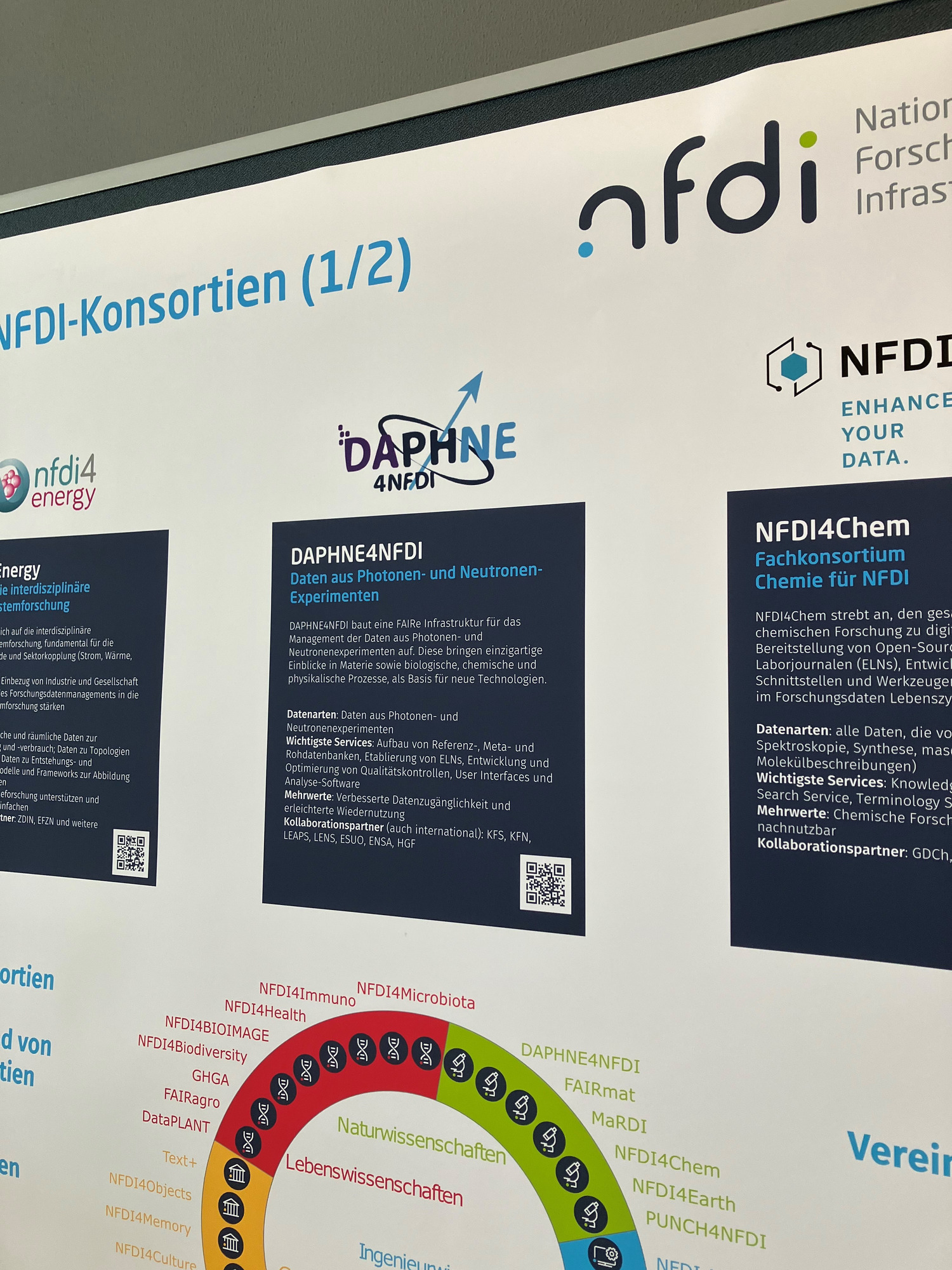 From April 24th to 25th, 2023, DAPHNE4NFDI was present with two representatives at the event "Datenräume in Deutschland und Europa gestalten - Impulse der Wissenschaft". The event, which was jointly organized by the German Council for Scientific Information Infrastructures (RfII) and the Volkswagen Foundation, consisted of numerous lectures, workshops and discussions and was very well suited to bring in the perspective of researchers from the fields of neutron and photon experiments. In addition, there was an exchange with other NFDI consortia, which presented themselves together with the NFDI office at a booth.
From April 24th to 25th, 2023, DAPHNE4NFDI was present with two representatives at the event "Datenräume in Deutschland und Europa gestalten - Impulse der Wissenschaft". The event, which was jointly organized by the German Council for Scientific Information Infrastructures (RfII) and the Volkswagen Foundation, consisted of numerous lectures, workshops and discussions and was very well suited to bring in the perspective of researchers from the fields of neutron and photon experiments. In addition, there was an exchange with other NFDI consortia, which presented themselves together with the NFDI office at a booth. -
-
3-5. April, 2023
-
DAPHNE4NFDI Annual meeting
-
From April 3rd to 5th 2023, more than 90 participants and enthusiasts of the DAPHNE4NFDI consortium met on the DESY campus in Hamburg for the annual status meeting of the DFG-funded project “Data from Photon and Neutron Experiments for NFDI” (DAPHNE4NFDI). Overall, 25 different German and European institutions were represented on-site.
The meeting opened on April 3rd with an internal session in which the members explored "White papers" in discussion rounds and engaged in passionate exchange of ideas and thoughts during round table discussions on selected wide interest topics (e.g., use cases, metadata, ELNs, RDMs). The discussions moved on after a "wrap up" to a discussion over snacks in front of about 40 detailed posters. The first day closed with a very insightful and inspiring public lecture by Andrea Thorn, entitled "The Coronavirus Structural Task Force: Open Data in Structural Biology", dealing with the struggles of determining the structure of the COVID-19 virus and the importance of open data towards the aim. It was impressive to see how a group of more than 30 - mostly young scientists - worked on a common goal for several years and how numerous structures were significantly improved and errors in the literature were avoided at an early stage in dialogue with the publishing groups.
The internal meeting continued on April 4th in the morning with parallel sessions, covering aspects like data analysis software, deep learning, metadata, training platforms, etc. The technical advisory board gave valuable recommendations during detailed discussions about sample PID, data storage and especially SciCat.
In the afternoon, the official open meeting started with the presentation of the DAPHNE4NFDI to the wider audience. Impressive developments in machine learning, autonomous experiments and data concepts in Munich (MLZ), Dresden (HZDR) and Hamburg/Schenefeld (EuXFEL) were presented. The second afternoon session with the European initiatives ExPANDS, OSCARS and the event programme of the ErUM Data Hub with workshop and schools also aroused particular interest. This open programme, which also attracted participants from Facilities and related activities, continued, also on the next day, with a welcome by Prof. Edgar Weckert, Director of Photon Science at DESY, and with another four exciting talks ranging from electronic lab books and data management to reference databases.
Overall the meeting fostered very fruitful and constructive discussions and stimulated the exchange of ideas among scientists with different approaches to common problems, leading to new inputs and concepts for the upcoming months.
-
-
January 22, 2023
New Deep Learning Workshops
In 2023, the ErUM Data Hub will host exciting workshops and schools in collaboration with DIG-UM. The events are aimed at participants from all ErUM communities and will be held at different locations in Germany.
The annual program 2023 includes three deep learning schools, two deep learning train-the-trainer workshops and workshops on Big Data Analytics, Sustainability in ErUM-Data, Research Data Management and Next Generation Environment for Interoperable Data Analysis.
-
-
Registration and Announcement
-
Registration for the workshops and schools will be done through Indico Events. The links to the events will be announced here. We look forward to active participation from all ErUM communities. Feel free to distribute the event poster.
-
January 12, 2023
-
Join DAPHNE at Love Data Week in February
-
 Photon and neutron (in particular) experiments performed at large-scale laboratory facilities are expensive to perform due to the high maintenance costs of said facilities. For this reason, making such data FAIR is highly desirable, as this will enable the maximum amount of knowledge to be extracted from it, even after the original experiment has long concluded. In this context, DAPHNE4NFDI aims to facilitate this transition towards FAIR data by developing infrastructure and workflows to aid in this data management issue.
Photon and neutron (in particular) experiments performed at large-scale laboratory facilities are expensive to perform due to the high maintenance costs of said facilities. For this reason, making such data FAIR is highly desirable, as this will enable the maximum amount of knowledge to be extracted from it, even after the original experiment has long concluded. In this context, DAPHNE4NFDI aims to facilitate this transition towards FAIR data by developing infrastructure and workflows to aid in this data management issue. -
During this event, three short presentations will be shown, which will describe the consortium and its goals, as well as two of the solutions that are in development within the framework of the project:
the first solution (presented by Dr. Philipp Jordt, Christian-Albrechts-Universität zu Kiel) deals with Metadata schemes for photon and data as well as the automatic transfer of the metadata generated at photon beamlines at DESY (Germany) into SciCat (the metadata catalogue).
The second solution (presented by Dr. Nebojsa Zec, Helmholz Zentrum Hereon) deals with the tool "Made2Reflect", which is developed for the analysis of neutron and x-ray reflectivity profiles from molecular dynamics simulations.
This event will take place on February 15th at 2 pm (Berlin time - UTC +1). -
Join.
-
-
December 5-7, 2022
-
DAPHNE work meeting at DESY
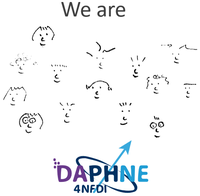
- On December 5th, 6th, and 7th, 2022, more than 50 members of DAPHNE4NFDI met at DESY in Hamburg on-site for the first meeting of the DFG-funded project “Data from Photon and Neutron Experiments for NFDI” (DAPHNE4NFDI), that started one year ago.
- As the event was held in a hybrid format, 20 persons among them joined on-line.
-
-
December 2, 2022
-
Blogpost No. 2: Deep Learning Pipeline for Surface Scattering Data
-
In this Blogpost, Linus Pithan and others from the Schreiber group at Univeristy of Tübingen present challenges and possible approaches for building a Grazing Incidence X-ray Diffraction (GIXD) data processing pipeline, putting an emphasis on machine learning applied to data analysis.
-
They demonstrate the implementation of such a software framework using gixi (Grazing Incidence X-ray diffraction Intelligent pipeline), which provides an end-to-end solution for automated GIXD analysis. This also includes image processing, detection of the diffraction peaks, peak intensity extraction, and crystal structure identification.
-
Applying the guidelines described in the DAPHNE proposal they provided interlinked example datasets, from raw- to analyzed data as well as the source code and parameters for all data processing steps involved in the data analysis chain, using Zenodo infrastructure.
-
More.
-
-
-
November 26, 2022
-
DAPHNE4NFDI@Women in Physics Conference in Karlsruhe
-
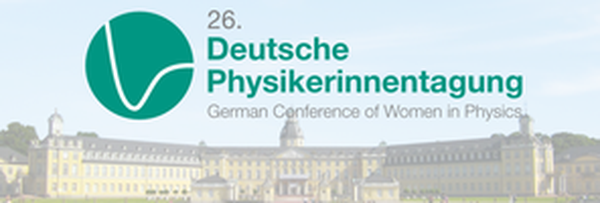 DAPHNE4NFDI and project TrackACT shared a booth at this year's Women in Physics Conference in Karlsruhe.
DAPHNE4NFDI and project TrackACT shared a booth at this year's Women in Physics Conference in Karlsruhe. -
This was a great occasion to inform about our projects. We networked with a large number of attendees and consortia, such as PUNCH4NFDI.
-
-
November 25, 2022
-
International DAPHNE XPCS Workshop
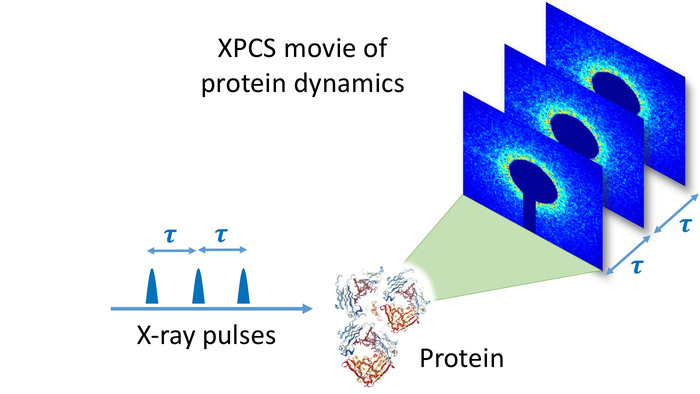 On Nov 25 DAPHNE organised an online workshop for the international X-ray photon correlation spectroscopy (XPCS) community with participants from Germany, France, Sweden and the USA.
On Nov 25 DAPHNE organised an online workshop for the international X-ray photon correlation spectroscopy (XPCS) community with participants from Germany, France, Sweden and the USA.
XPCS users and beamline scientists from PETRA III, ESRF, European XFEL, APS, NSLS II and LCLS discussed the status quo of data management, analysis pipelines and needs for achieving FAIR XPCS data.Data formats and metadata standards for data repositories have also been discussed.
The main outcome of this workshop was the common decision to build up a repositoriy for XPCS data.
First steps necessary to achieve this goal have been identified and a possible technical outline and realization will be presented in due time to the community. -
-
October 27, 2022
-
DAPHNE ELN-Use Case presented at TrackAct
- More than 95% of all chemical products
have seen a catalyst during their production and it is crucial to develop and optimize catalysts as efficiently as possible. The goal of project TrackAct is to identify and track the nature of the active site of catalysts.
- At this year’s project status meeting, DAPHNE4NFDI was invited to exchange views about the challenges of catalyst operando XAS measurements.
-
-
October 10, 2022
-
DAPHNE TA2 Workshop
-
Metadata and Repositories
- From September 29th to September 30th, members of DAPHNE4NFDI Task Area 2 (TA2), (Meta)data repositories and catalogues, met in Erlangen
to discuss sample IDs, metadata formats, as well as FAIR data and reproducibility. - More.
-
September 29, 2022
-
Internal Workshop on ELNs and Metadata
-
From September 20 to 22nd,
members of DAPHNE4NFDI Task Area 1, Managing Data Production, met in Frankfurt to discuss metadata fields, metadata schemata and electronic lab notebooks (ELNs) for instrument scientists.
-
This was an excellent opportunity to network amongst users and instrument scientists.
-
More.
-
September 23, 2022
-
DAPHNE@ADCR
-
At this year’s Annual Digital Catalysis & Catalysis-Related Sciences Conference, the ADCR, DAPHNE4NFDI had the chance to present itself by two posters.
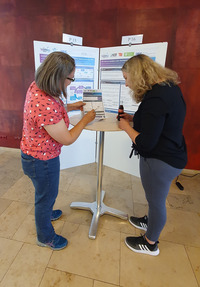
-
The conference was organized by NFDI4Cat, and DAPHNE4NFDI members also participated in the lectures and World Café events, spanning from Artificial Intelligence (AI) and natural language processing (NLP), Ontologies and Taxonomies, Electronic laboratory notebooks to Open science – digital economy.
-
-
September 17, 2022
-
DAPHNE uses HIFIS
-
A large project like DAPHNE4NFDI needs a reliable infrastructure. Therefore, DAPHNE4NFDI relies on Helmholtz Federated IT Services (HIFIS).
Currently, DAPHNE4NFDI uses a Virtual Organization (VO) to organize access rights for services such as Sync & Share. Events are organized by the consortium using HIFIS Events and communication between project participants has been enabled via Mattermost.
-
More about HIFIS.
-
-
September 15, 2022
-
New Publication
-
Read the exciting story on how DAPHNE4INFDI data can be used for an End-to-End Deep Learning Pipeline for Real-Time Processing of Surface Scattering Data at Synchrotron Facilities.
-
-
-
September 7-9, 2022
-
DAPHNE4NFDI@SNI2022
-
Finally!
During the German Conference for Research with Synchrotron Radiation, Neutrons and Ion Beams at Large Facilities (SNI2022) that took place in Berlin, Germany from 5th to 7th September 2022 some DAPHNE4NFDI task areas leaders as well as PhDs, Postdocs and other participants of the project met in person (!) to talk about latest developments and ideas for the future. The three-day conference gave rise to great discussions - not only during the Micro Symposium on “Data & Digitalization” and the two poster sessions.
-
-
We are already looking forward to the next DAPHNE4NFDI in-person meetings – so stay tuned!
-
August 4-5, 2022
-
Shaping the Future of Neutron Experiments
-
From August 4-5, 2022, members of the DAPHNE Dissemination and Outreach team met at the Heinz Maier-Leibniz-Zentrum (MLZ) to discuss t
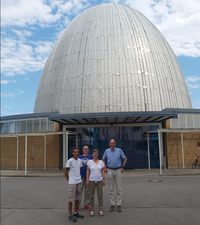 he future of digital neutron research.
he future of digital neutron research.
The participants attended a number of meetings on Use Cases regarding metadata for instrument control, ELNs and metadata ingestion. A short summary of the meeting can be found here.
In short, it was a very productive meeting with lots of interesting topics. We hope to conduct similar meetings at other DAPHNE4NFDI facilities.
If you are interested in joining DAPHNE4NFDI, please send us an email at: contact ∂does-not-exist.daphne-nfdi de.
-
July 29, 2022
-
Workshop on SampleDB and SciCat
-
On June 29th, Moritz Hannemann, working for JCNS at MLZ, held a workshop on the comparison of SampleDB and SciCat. During his talk he gave some insights on the similarities and differences of both systems. In addition, he presented his results regarding the performance for ingestion and querying both databases. Both solutions are suitable for DAPHNE4NFDI. If you intend to use them, please take a look at Moritz’s list of specific features.
A compiled version of the workshop has been prepared as a report and can be found here.
-
-
July 1st, 2022
-
ErUM-Data-Hub: Deep Learning School I
-
In August 2022, ErUM-Data-Hub and DIG-UM will host the first Deep Learning School at Landhaus Nordhelle in Meinerzhagen. In a beautiful ambience, over 4 days of intensive lessons are held on the topics of Neural Network Building Blocks, Mastering Model Building, Convolutional Neural Networks, Recurrent Neural Networks and Introspection of Neural Networks. The workshop is aimed at beginners from all ErUM communities who have basic physical knowledge.
-
-
June 24, 2022
-
SNI2022: DAPHNE Microsymposia
-
DAPHNE4NFDI will be presented at two Microsymposia at SNI2022:
-
Date Event September 5, 11:15 h Microsymposium Digitalisation (DAPHNE, ErUM-Data) September 5, 14:15 h Artificial Intelligence for Large-scale Facilities SNI2022 provides an excellent opportunity to exchange with DAPHNE scientists directly.
-
NEW: You can register for an Early Bird Fee until July 10, 2022. Posters can also be submitted until then.
-
-
May 30, 2022
-
Statement DAPHNE4NFDI Executive Board - Test and Evaluation of SciCat
-
The DAPHNE4NFDI Executive board recommends that the DAPHNE participants test and evaluate SciCat at their home labs in universities and at facilities - if possible.
They should provide feedback and indicate where further collective development is required - including deployment and integration.
To support SciCat-related activities, a SciCat round table will be organized by Linus Pithan (TA3) and a topic-specific mailing list was created by TA6. -
(Subscription to mailing list: E-Mail to: sympa∂desy.de - Subject: subscribe daphne4nfdi-scicat ∂does-not-exist.desy de First Name Name)
-
-
May 23, 2022
-
SNI2022: Submission deadline for posters extended to July 10
-
Due to high demand, the deadline for submitting posters for the SNI2022 conference has been extended to July 10. Text abstracts should be no longer than 1500 characters and should not include graphics. Early bird registration is open until June 26.
- May 19, 2022
-
SciCat Workshop for DAPHNE Users
More than 30 attendants participated in the SciCat Workshop on May 17. It was focusing on small scale installations for university users. SciCat is a metadata catalogue for scientists. In this workshop it was shown how it helps photon- and neutron research facilities to develop their own metadata strategy to follow FAIR principles.
Tobias Richter from European Spallation Source (ESS) gave an overview on SciCat, showing that it is flexible, customisable and extensible with a modern code base. It is actively developed and maintained. He also described which features SciCat provides and drew the line what SciCat doesn’t provide, so that users get a clear picture of what to expect.
Linus Pithan from university of Tübingen presented an extension to SciCat to create datasets through a web interface that easily allows to add metadata to SciCAT. He suggested to consider collaborative software development efforts within DAPHNE to contribute to SciCat.
Following his presentation, Use Cases for actual small-scale installation of SciCat were presented by Jonas Graetz (FAU, Erlangen) and Alexander Hinderhofer (Uni Tübingen).
The workshop closed with a discussion about the future of SciCAT especially in the context of DAPHNE, for example, how to avoid island solutions and to settle for a coherent strategy and use synergies between the involved actors.
More information on the workshop can be found at https://events.hifis.net/e/scicat4daphne.
SciCat website -
- May 13, 2022
-
Apply now for Deep Learning Train the Trainer Workshop!
-
Second Deep Learning Train-the-Trainer Workshop
09.06. und 10.06.2022 - Wuppertal.Aim of this workshop is to educate lecturers for future teaching activities and to provide material to give lecture series on deep learning, including hands-on-exercises. This workshop is addressed to scientists from all ErUM communities with prior knowledge of neural networks with an academic level of postdoc or higher.
All attendees should be willing to give in the future deep learning lectures at schools and workshops. -
- April, 2022
-
DAPHNE4NFDI @ CDCS Opening Symposium 2022, DESY (Hamburg)
-
.jpg) What a great opportunity: During the inaugural symposium of the Center for Data and Computing in Natural Sciences (CDCS) from 26th to 28th of April 2022 we were introducing the consortium to a broad scientific audience. The on-site event, themed “Data Science for Cross Disciplinary Research”, provided a platform for interesting topics like data storage, evolution of imaging and also machine learning and showed: a better research data infrastructure, user-driven solutions and long-term storage are not only needed in the future of photon- and neutron experiments!
What a great opportunity: During the inaugural symposium of the Center for Data and Computing in Natural Sciences (CDCS) from 26th to 28th of April 2022 we were introducing the consortium to a broad scientific audience. The on-site event, themed “Data Science for Cross Disciplinary Research”, provided a platform for interesting topics like data storage, evolution of imaging and also machine learning and showed: a better research data infrastructure, user-driven solutions and long-term storage are not only needed in the future of photon- and neutron experiments! -
-
March, 2022:
Online NFDI NeXus Workshop
More than 130 attendants informed themselves about NeXus on March 17-18 at the “Online NFDI NeXus Workshop“. NeXus is a common data format for neutron, x-ray, and muon science. It is constantly being developed as an international standard by scientists and programmers representing major scientific facilities to facilitate greater cooperation in the analysis and visualization of neutron, x-ray, and muon data.
On March 17th, usage and recent developments around NeXus were presented by different research organisations and the industry. March 18th was dedicated to getting to know each other better. Therefore, a session was held with short presentations. 18 presenters introduced their work in 2-3 slides. In four parallel sessions specific topics e.g., measurement technics and file formats were addressed. The workshop closed with a session introducing tools for creating and validating NeXus files.
Presentations from the workshop can be found here.
-
- January 24, 2022: Satellite workshop at DESY Photon Science Meeting "Science driven data management solutions" (Organizer: A. Barty, Time: 13.00 - 17.00, more info here).
- January 20, 2022: The digital community meeting for the foundation of the ErUM-Data umbrella organisation *DIG-UM* will take place on 20 January 2022, from 14:00 to 17:00. A festive part and a technical part on perspectives of digital transformation in ErUM research are planned.
- December 1, 2021: Kick-Off meeting, programm
- During this event DAPHNE4NFDI officially started and held a very lively on-line kickoff meeting, including contributions from partners from universities, facilities and industry, who represent both the neutron and synchrotron communities. All interested scientists were and are invited to join the task area working groups. To do so please contact the task area leaders by email.
- July 2, 2021: Press release "Funding of the consortium "DAPHNE4NFDI" within the framework of the National Research Data Infrastructure announced" by the involved committees KFS and KFN
- July 2, 2021: Press release "National Research Data Infrastructure: DFG Welcomes Second-Round Funding Decisions" of the DFG

